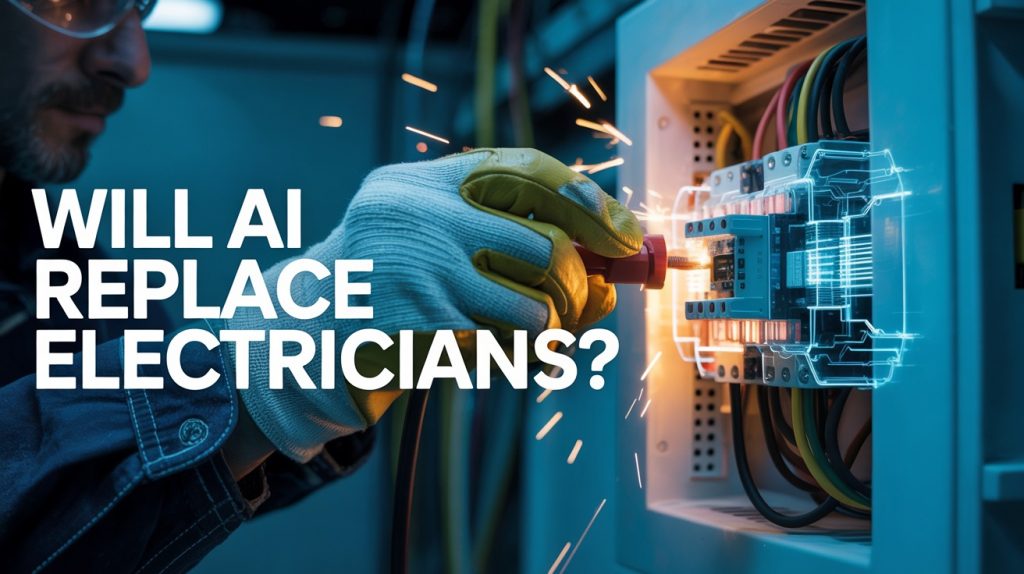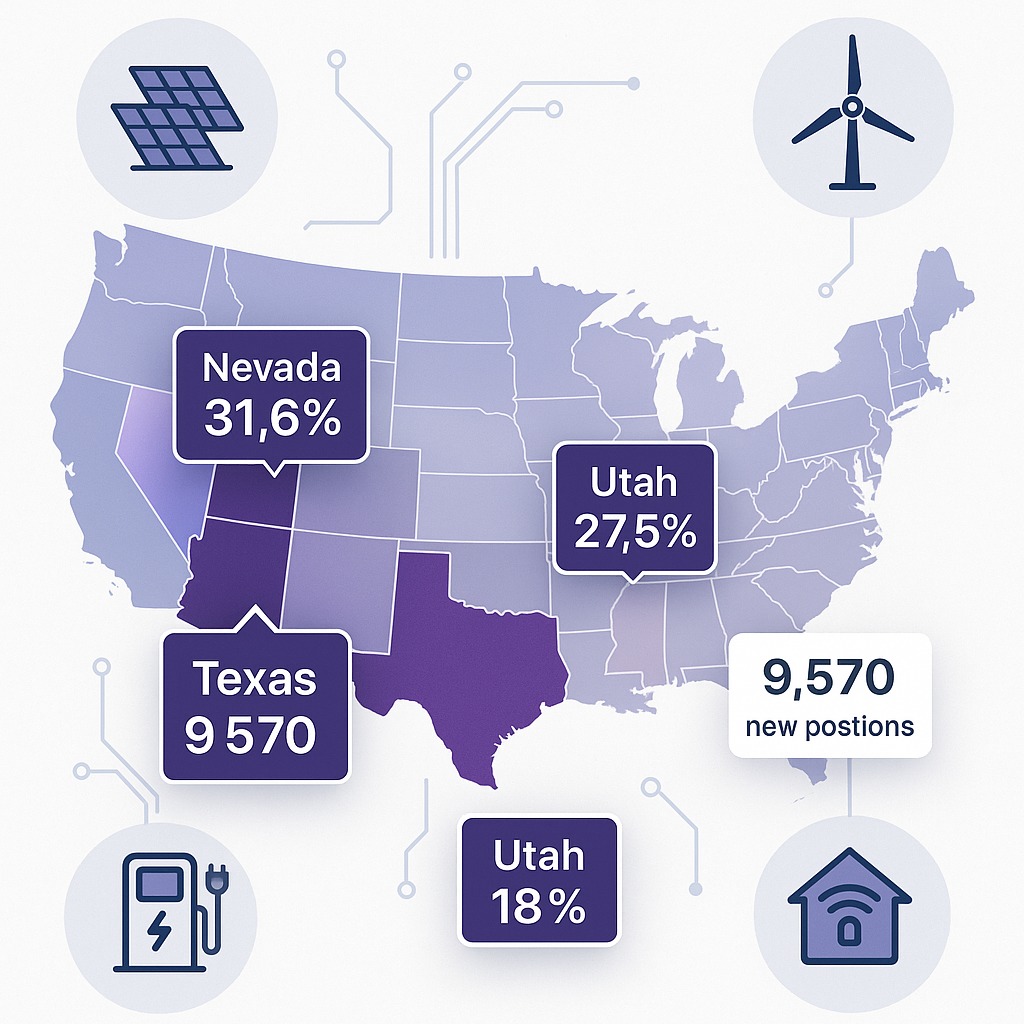Google’s $10 Million Answer Says No – Here’s Why Your Electrical Career Is More Secure Than Ever
AI will not replace electricians but will serve as powerful tools that make electrical work safer, faster, and more precise. The combination of human expertise and artificial intelligence creates better outcomes for both electricians and their customers.
The electrical industry sits at a crossroads. AI technology grows stronger each day, and skilled electricians wonder if robots will take their jobs. Recent data from Google’s $10 million investment to train 100,000 electricians sends a clear message: artificial intelligence will enhance electrician work, not eliminate it.
The Bureau of Labor Statistics projects 11% job growth for electricians through 2033. This growth rate beats the 3% average across all occupations. These numbers tell a story of expansion, not replacement.

Will AI Fully Automate the Work of Electricians?
The electrical trade requires complex manual skills that robots cannot replicate. Wire connections demand precise hand movements in tight spaces. Troubleshooting electrical problems involves reading environmental cues and making safety decisions that only human experience can provide. Customer interaction and trust-building remain exclusively human capabilities.
Physical Limitations of AI in Electrical Work
- Complex hand movements for wire connections in confined spaces
- Environmental adaptability for diverse job site conditions
- Real-time safety assessment and risk management
- Customer communication and trust-building capabilities
National Electrical Code regulations require human oversight for all electrical installations. Licensed electricians must inspect, verify, and sign off on electrical work regardless of automation involvement. This regulatory framework protects both workers and consumers while ensuring electrical safety standards.
Expert Analysis: Oxford Economics research shows that while 42% of electrician tasks could theoretically be automated, only 9% job demand decrease is predicted. The complex nature of electrical work creates natural protection against full automation.
Advanced AI voicemail systems help electrical contractors manage customer communications, but the core electrical work remains firmly in human hands. This division of labor allows electricians to focus on technical expertise while AI handles administrative tasks.
What AI Tools Are Currently Used in Electrical Work?
Modern electricians use AI-powered diagnostic equipment, predictive maintenance software, and smart project management tools daily. These technologies enhance human capabilities rather than replace electrical expertise.
Thermal imaging cameras with AI analysis detect electrical hot spots invisible to human eyes. Fluke’s thermal imagers process temperature patterns and highlight potential failure points before they cause outages. This early detection capability prevents costly emergency repairs and improves electrical system reliability.
Smart Diagnostic Tools
- AI-powered multimeters that suggest troubleshooting steps
- Thermal cameras with pattern recognition software
- Circuit analyzers with automated fault detection
- Power quality monitors with predictive algorithms
Predictive maintenance software analyzes electrical equipment performance data to predict failures. C3 AI Reliability systems help utilities reduce transformer failures by 48% and achieve $800,000 annual operational savings. These tools provide electricians with advance warning of equipment problems.
AI call management suites handle scheduling, customer service, and job tracking. These systems free electricians to focus on technical work while maintaining excellent customer service.
How Will AI Affect Different Types of Electricians?
AI impact varies significantly across residential, commercial, and industrial electrical sectors, with industrial electricians seeing the most AI integration and residential electricians maintaining the strongest job security.
| Sector | AI Integration Level | Job Security | Key Applications |
|---|---|---|---|
| Residential | Low | Highest | Smart home installation, customer service |
| Commercial | Medium | High | Building automation, energy management |
| Industrial | High | High | Predictive maintenance, process automation |
🏠 Residential Electrical Work
Residential electricians face the lowest automation risk due to unique site challenges and customer interaction requirements. Home electrical work involves diverse architectural styles, aging wiring systems, and homeowner preferences that require human adaptation and communication skills.
Real estate call center AI supports residential electricians by managing property inspection scheduling and customer inquiries. This technology partnership allows electricians to focus on hands-on electrical work while maintaining professional customer service.
🏢 Commercial Electrical Applications
Commercial electricians benefit from AI tools that manage complex building systems and energy optimization. Office buildings, retail stores, and institutional facilities use smart electrical systems that require human expertise for installation and maintenance.
Healthcare call center AI demonstrates how specialized industries require both AI efficiency and human electrical expertise. Medical facilities need reliable electrical systems with human oversight for patient safety and regulatory compliance.
🏭 Industrial Electrical Specialization
Industrial electricians work with the most advanced AI-integrated electrical systems. Manufacturing facilities, power plants, and industrial automation systems rely heavily on AI for monitoring, control, and optimization.

Will Automation Reduce Demand for Electricians?
The renewable energy transition creates massive new opportunities for electrical workers. Solar installations employ 279,447 workers nationwide with 5.9% annual growth. Wind energy positions show 48% projected growth by 2033. Electric vehicle charging infrastructure expansion requires thousands of skilled electricians annually.
Environmental call center AI supports the growing green energy sector by managing customer inquiries and project scheduling. This technology enables environmental companies to scale their operations while maintaining quality electrical installation services.
Growth Drivers Through 2035
- Renewable energy system installations
- Electric vehicle charging network expansion
- Smart grid infrastructure upgrades
- Building electrification projects
- Industrial automation system maintenance
What Industry Experts Say About AI and Electricians
Industry experts unanimously agree that AI will enhance rather than replace electrician careers, with major organizations investing billions in human-AI collaboration programs.
McKinsey analysis reveals that while 30% of tasks across 60% of occupations could be automated, electricians remain protected by job complexity and safety requirements. The consulting firm’s research shows electrical work combining automated tools with irreplaceable human expertise.
Expert Consensus Data
- Oxford Economics: 9% job demand decrease despite 42% task automation potential
- Bureau of Labor Statistics: 11% growth projection through 2033
- Google: $10 million investment in electrician training programs
- IBEW: 860,000 members focusing on AI integration training
The International Brotherhood of Electrical Workers (IBEW) views AI as an enhancement tool rather than a threat. Their 2024 training programs emphasize smart grid integration and predictive maintenance interpretation. This approach prepares electricians to work effectively with AI-powered systems.
Call center AI solutions represent the type of AI integration that supports electrical contractors without threatening core electrical work. These systems handle administrative tasks while skilled electricians focus on technical expertise and customer service.
How Software Tools Transform Electrical Diagnostics
AI-powered software tools revolutionize electrical diagnostics by providing instant analysis, pattern recognition, and predictive insights that make electricians more effective troubleshooters.
Modern diagnostic software analyzes electrical system data in real-time to identify problems before they cause failures. These tools process complex electrical signatures that human senses cannot detect, providing electricians with superhuman diagnostic capabilities.
AI call routing systems help electrical contractors efficiently manage diagnostic service calls. These tools prioritize emergency situations and match customer needs with appropriate technician expertise.
Diagnostic Software Categories
- Thermal pattern analysis for hot spot detection
- Power quality monitoring with trend analysis
- Circuit behavior modeling and simulation
- Equipment health scoring and failure prediction
🚀 Ready to Future-Proof Your Electrical Business?
While AI enhances your technical capabilities, let MissNoCalls handle your customer communications. Our AI-powered phone systems ensure you never miss a lead while you focus on what you do best – electrical work.
Discover Customer Service AI SolutionsTraining for the AI-Enhanced Future
Google’s $10 million investment in electrician training represents industry confidence in human-AI collaboration, with programs designed to enhance rather than replace electrical expertise.
Essential skill development focuses on integrating AI tools with traditional electrical knowledge. Training programs teach electricians to interpret AI-generated diagnostic data while maintaining core electrical installation and troubleshooting skills.
Core Training Areas
- Smart diagnostic tool operation and interpretation
- IoT electrical device installation and configuration
- Predictive maintenance data analysis
- Cybersecurity awareness for connected systems
AI voice bot solutions for lawyers illustrate how professionals in various fields adapt to AI tools while maintaining core expertise. This pattern applies to electricians who enhance their capabilities with smart technology.
🛡️ Safety Standards and Human Oversight
Electrical safety regulations mandate human oversight for all installations, creating permanent job security for licensed electricians regardless of automation advancement.
National Electrical Code (NEC) requirements specify that qualified electricians must verify all electrical work meets safety standards. These regulations apply equally to AI-assisted installations and traditional electrical work, ensuring human expertise remains essential for code compliance.
Collection agency AI bots demonstrate how AI handles administrative functions while humans maintain responsibility for core professional services. This separation protects both liability and expertise requirements.
Economic Impact: Growing Wages and Opportunities
Electrician wages continue growing as AI tools increase productivity and market demand expands, with median salaries rising from $54,000 in 2015 to $62,350 in 2024.
The skilled trades shortage drives consistent wage growth across the electrical industry. Experienced electricians command premium salaries as employers compete for qualified workers. This labor market dynamic creates economic security for electrical professionals.
Sales call AI systems help electrical contractors grow their businesses by efficiently managing customer acquisition and follow-up. This technology support enables contractors to focus on technical work while expanding their market reach.
🌟 Future Opportunities in Emerging Technologies
The next decade presents unprecedented opportunities for electricians in electric vehicles, renewable energy, smart buildings, and industrial automation sectors.
Electric vehicle charging infrastructure requires massive electrical system installations across America. The Biden administration’s goal of 500,000 charging stations by 2030 creates thousands of electrician positions. These installations require both traditional electrical skills and new technology proficiency.
24/7 AI voice agents support electrical contractors serving these emerging markets by providing round-the-clock customer service and emergency response coordination.
Your Electrical Career Thrives in the AI Era
Industry investment patterns, job growth projections, and expert forecasts all point toward a future where electricians work alongside AI tools rather than being replaced by them. Google’s $10 million training investment demonstrates confidence in human-AI collaboration for electrical work.
The unique combination of physical skills, safety expertise, and customer interaction abilities makes electricians irreplaceable in the modern economy. While AI handles data analysis and routine tasks, human electricians provide the judgment, creativity, and hands-on skills that electrical work demands.
Career Security Factors
- Regulatory requirements for human oversight
- Physical installation demands requiring human skills
- Customer trust and communication needs
- Complex problem-solving requirements
CRM integration solutions help electrical contractors leverage AI for business growth while focusing on core electrical expertise. This technology partnership model represents the future of electrical work.
Electricians who embrace AI tools while maintaining traditional skills will find the greatest success in evolving markets. The combination of human expertise and artificial intelligence creates superior outcomes for customers and sustainable careers for electrical professionals.








